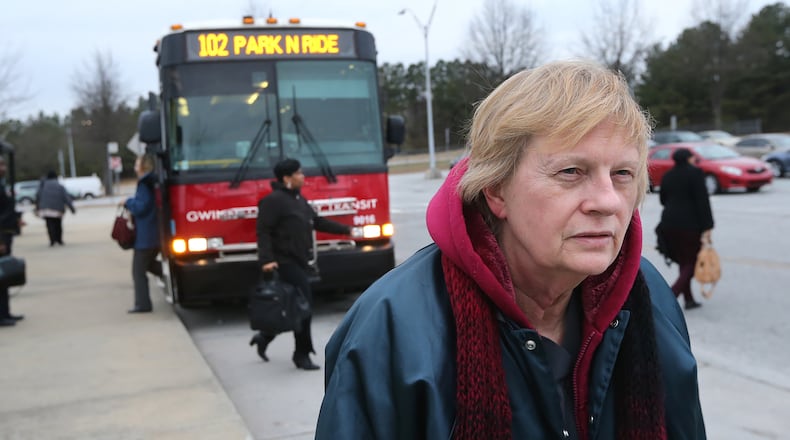After decades as the poor stepchild of transportation, mass transit could get plenty of love at the Gold Dome in 2018.
Atlanta's traffic mess and economic development concerns — including Amazon's search for a second corporate headquarters — have made public transportation an urgent priority at the Capitol and at county courthouses.
A House of Representatives commission is discussing ways to boost state funding for public transportation — likely in the form of spending on capital projects. Lawmakers also want to consolidate the alphabet soup of agencies that provide transit services in metro Atlanta to make the system more efficient.
“The devil’s in the details,” said state Rep. Kevin Tanner, R-Dawsonville, the chairman of the House Transportation Committee. “But if we can make it happen, it would be truly transformational for this state.”
Transit won't be the only hot transportation issue during the upcoming session. Another House committee has been studying ways to combat distracted driving, and it could recommend legislation requiring drivers to use hands-free cellphone technology.
Not long ago, transit talk was scarce in the General Assembly. Well-documented financial and operational problems long fueled anti-MARTA sentiment among legislators. And suburban resistance made talk of a regional transit system politically toxic.
But years of improvements at MARTA have thawed relations with lawmakers. Construction of several corporate headquarters along MARTA lines has opened eyes about the importance transit plays in economic development. And changing attitudes have paved the way for talk of transit expansion in the suburbs.
The state's two largest counties — Fulton and Gwinnett — plan transit referendums in November. For those votes to happen, they'll need state legislation allowing local governments to collect transportation sales taxes for at least 20 years, and likely longer. The long TSPLOST life is needed to meet federal funding requirements and to pay for big-ticket projects such as light rail or bus rapid transit.
Meanwhile, a House commission has been studying state funding for mass transit. Georgia spends about $14.5 million on transit annually — much of it for Xpress bus service in the Atlanta area. That's enough for Georgia to rank 27th among the 50 states in spending on public transportation.
Lawmakers say they’re not inclined to subsidize transit operations. Instead, they’ve discussed finding a dedicated funding source for capital projects.
“I think the state’s role would be capital construction,” said state Sen. Brandon Beach, R-Alpharetta, the chairman of the Senate Transportation Committee. “We do billion-dollar projects, and we’re pretty good at it.”
Tanner wants to tackle funding for metro Atlanta in 2018 before taking up transit issues in the rest of the state next year. But there's a catch: Lawmakers also want to consolidate the slew of agencies that provide public transportation across the Atlanta region.
Exactly what that would look like is unclear — the House commission won’t unveil specific proposals until late this month, and the Senate may draft separate legislation. Tanner envisions a regional planning and funding board covering the 13 counties served by the Xpress bus system; Beach thinks it makes sense to focus on the five largest metro counties: Clayton, Cobb, DeKalb, Fulton and Gwinnett.
Tanner said MARTA, Gwinnett County Transit, CobbLinc and other agencies likely would continue to operate transit services. But consolidating some of their planning and funding functions would still mean finessing touchy issues of local control.
Local officials say they support the initiative. But they’re mindful that anything that passes the Legislature this session will affect the prospects of ballot measures in November.
“You have to make sure that whatever is proposed is sellable to the public,” said Fulton County Commissioner Liz Hausmann, a leader of the county’s transit initiative.
Meanwhile, another House committee has been studying distracted driving. Fatalities from motor vehicle accidents are on the rise in Georgia and across the nation. Experts say driver distraction caused by cellphones is a likely culprit.
The commission has discussed legislation requiring drivers to use hands-free cellphone technology, though it has not yet released recommendations. Previous efforts to enact such a law have gone nowhere, and it's unclear whether new proposals would do any better.
MYAJC.COM: REAL JOURNALISM. REAL LOCAL IMPACT.
The AJC's David Wickert keeps you updated on the latest in what's happening with transportation in metro Atlanta and Georgia. You'll find more on myAJC.com, including these stories:
• New metro Atlanta express lanes: Traffic relief if you pay by the mile
• Major work begins on one of metro Atlanta's worst traffic bottlenecks
• Atlanta traffic after I-85: It's going to get worse
Never miss a minute of what's happening in Atlanta transportation news. Subscribe to myAJC.com.
About the Author
Keep Reading
The Latest
Featured



